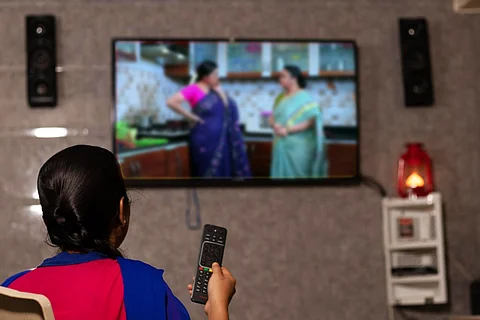

The Sooraj Barjatya era of the Hindi cinema industry, even today, is etched in the minds of many film buffs for better or worse. The chief of conglomerate Rajshri Productions, he has produced and directed many films that propound the idea of ‘ideal family’ through his [questionable] hits like Hum Saath Saath Hain. Mamaji [maternal uncle] from Hum Saath Saath Hain once said the family where ladies serve men, at the dining table, is an ideal family. The daily soaps took it so seriously, they still follow it. It has been decades since!
Following suit are Kannada TV serial makers who have continually created regressive shows. With the advent of remakes in the industry, the regressive quotient of these shows has increased manifold. These serials have been silently advocating patriarchal ideas that make women the centre of familial life, and any woman with modern sensibilities is vilified since she does not represent what an “ideal woman” looks like.
From Subbalakshmi Samsara to Bramhagantu, the plots of shows have worsened, and so have standards for women.
Subbalakshmi Samsara, a remake of the popular Marathi serial Mazhya Navryachi Bayko (My Husband’s Wife), was a disaster in most aspects but was well received by the audience. The plot revolves around a married couple wherein the husband is having an affair with another woman. On one hand, the wife—Subbalakshmi—is shown to be an obedient and righteous character, on the other hand, Shanaya is depicted as a woman of no morals; she is a manipulative and selfish character. The two are constantly pitted against each other by the supporting cast to fight over the man.
The show only gets ridiculous from there. The two women are forever trying to shove each other down. Even when Subbalakshmi tries to start her own business, it is only to win over her husband. Until it went off-air in May 2020, the serial had managed to impress the viewers with its archaic plot that suggests women are always each other’s nemesis.
One would have thought that this trope has been exploited by serial makers enough, but there are more serials that are based on the same concept. This popular Kannada serial takes the trope a notch higher by adding supernatural elements to the mix.
Yaare Nee Mohini’s plot revolves around the character Mutthu, whose stepmother secretly plots to kill him and amass all his wealth. However, his first wife Chitra's spirit is always around to foil all her attempts. The stepmother, in her quest to amass wealth, plans to get Mutthu married to her niece Maya, who’s shown to be equally sinister. However, Maya has to compete with Belli, a naïve relative who had harboured the dream of marrying the male protagonist ever since she was a child.
What ensues is a back-and-forth fight between the characters, with the assistance of tantric means to get rid of the enemy. In this day and age when people are striving to promote scientific and rational thinking, this serial upholds the veneration of superstitious beliefs in black magic and spirits. As if the show was not regressive enough already.
Decades of debates surrounding feminism and women's issues in the country lose ground when serials like these are produced ever so often. Such shows reiterate and amplify the patriarchal system that women have been trying to fight, by glorifying the idea that a woman's life revolves around that of her husband, and by extension, his family.
Another remake of a Hindi show, Bramhagantu, became the epitome for setting the standard for how women are expected to silently bear with all the abuse hurled their way and keep being the glue that holds the family, no matter what.
Geetha is an obese woman who often has to bear constant remarks from her sister-in-law and always has to go through trials and tribulations just to see her husband Lucky fulfil his dream of playing kabaddi professionally. It is the same husband who once was body-shaming her, bullying her because he had an athletic build unlike her. She puts up with it silently while her mother-in-law shoots daggers her way because she was not keen on the match either.
The protagonist often throws herself under the bus, wanting to safeguard familial ties, only to be met with more criticism. In spite of it all, the serial is touted to be one of the more progressive ones for breaking conventional norms, like having an overweight lead.
The lopsided narrative of the shows relegates the real issues that need to be discussed in the backseat while enabling abusive behaviour directed at women. They solidify the belief that women are subdued and the "weaker sex". Attempts at creating more progressive shows eventually meet the same result; they stay within the safe confines of gender stereotypes. It is about time this changes.